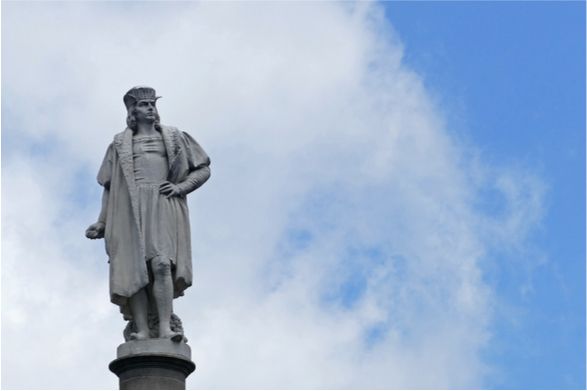The New Haven Board of Alders is scheduled to hold hearings this week on whether the city should turn Columbus Day into “Indigenous Peoples’ Day.”
Although the proposed resolution does not mention Columbus by name, it calls upon the city to “permanently recognize ‘Indigenous Peoples’ Day” on the second Monday in October each year — the day currently set aside by the federal government to honor Christopher Columbus.
Columbus, it seems, has fallen out of favor — wrongly blamed for every horrible thing done to native people in all of the Americas, from the time of the Encounter to the present.
What started in 1991 in Berkeley, Calif., as a fringe movement to trash the Admiral of the High Seas is now part of a growing trend. Ironically, even Columbus, Ohio, last year succumbed to the pressure, canceling its celebration of the man for whom the city was named.
New Haven should not follow suit.
While Native Americans, understandably, seek cultural recognition and a holiday of their own, the move to do away with Columbus Day is wrongheaded and deliberately provocative.
Columbus Day has particular significance to Italian Americans, who view the man from Genoa as a symbol of ethnic pride, and to Latinos, whose culture was born from the Spanish colonization ushered in by Columbus. Both of these ethnic groups are a vibrant part of the New Haven community.
While Italians and Latinos have a special affinity for the Italian navigator who set sail on behalf of Spain, Columbus Day is important to Catholics of all ethnic backgrounds. This is because a primary purpose of Columbus’s mission was to spread the Catholic faith. No wonder, then, that the New Haven-based Catholic fraternal organization calls itself the Knights of Columbus — a name it chose at a time when many in Connecticut were hostile to Catholics.
Columbus, of course, is more than a symbol of ethnic or religious pride. As the “first immigrant,” he is a symbol of all those who come to America in search of something more.
As President Ronald Reagan once noted, Columbus Day is “a day to celebrate not only an intrepid searcher but the dreams and opportunities that brought so many here after him and all that they and all immigrants have given to this land.”
More broadly, Columbus is an archetype of American ideals: adventure, innovation, risk-taking.
By setting out into the unknown, Christopher Columbus forever changed the course of human events. In honoring Columbus, we celebrate not only his bravery, but the integration of two previously autonomous hemispheres, the beginnings of colonies that would eventually become new nations, and the free and diverse societies that resulted from the European presence here.
In the simplest terms, Columbus Day is what President Barack Obama called the celebration of one journey that “changed the trajectory of our world.”
Columbus Day, then, doesn’t just celebrate one man. It honors a major turning point in world history, the immigrant experience, and American ideals and aspirations generally.
In that sense, Columbus Day is a truly American holiday. New Haven would be wrong to eliminate it.


